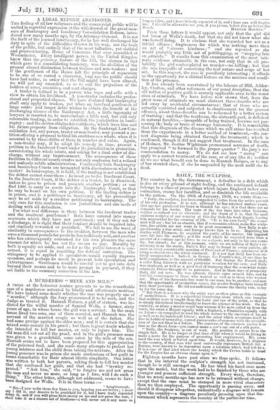BAILY, THE SCULPTOR.
THE country is, by the Government, a defaulter in a debt which is due on every ground of right feeling, and the continued default belongs to a class of proceedings which injure England in her own estimation, cramp her faculties, and so diminish the life available to the nation. On the 29th of January, 1859, we wrote thus :—
" Baily, the sculptor, has been compelled to retire from the active pursuit of his own profession. It is not, although he has attained mature years, that age has paralyzed his hand or blinded his eye ; it is that there are no demands for his works. The taste of the day runs into other fashions, neither so refined nor so elevated ; and the worst of it is, that the most eminent sculptor of our country at this day finds his work depart, leaving him unprovided for the evening of life. "It is his own fault," the econo- mist will say ; but let us observe, that if economists seldom make fine sculp- tors, fine artists are not wont to be good economists. Now Daily is un- questionably a fine artist, and Europe knows him to be so. Beginning his studies with Flaxman, he acquired the purity of his master, but inapired more life into the marble ; ard the work which he executed more than a quarter of a century ago he lives to see a classic, not only in his own coun- try, but abroad ; or at this moment, while we are talking of Daily's re- tirement; from the studio, Baily's Eve may be found in every gallery, al- most in every considerable mansion of Paris and of France ; specimens of it being scattered over the whole continent. It is not that Bally has been en- tirely unappreciated. Indeed, in George the Fourth's day, at one time he held commissions to the amount of 60,0001. But George the Fourth died ; a sailor King followed, with no particular vocation for the lute; and Daily was displaced, as well as a good deal of trumpery that the somewhat indis- criminate Prince thought fit to patronize. And in those days of prosperity Bully did not save. He was affluent, friends came around him, and he lent his countenance to those who wanted as well as to those who wanted not. Thus of his thousands five went to one man, ten to another ; and now that the opportunity of production ceases, the master Sculptor finds himself with short provision. He did not sufficiently observe the thrifty rule, to lay by for the rainy day. ." But there is a reason why the artist race so often gives us this example of unthriftiness. It is a superficial blundering alone which can imagine that nothing more is taught than the hand and eye of the artist, or that he is simply disciplined intellectually to know the science of his work. On the contrary, as many a master could bear witness if he were called up from the tomb, the artist a Mozart equally with a Raphael, a Praxitehat equally with an Ariosto—is compelled to lend his whole nature to the emotions of his art as well as to its handicraft labour ; and the mind which accustoms itself to live in habits of sympathy, cannot pursue rules of economy with the straight- ness of the red lines in a ledger. 'fhe converse of the common saying is as true as the direct form—you cannot make sow's ear out of a silk purse. "Daily, the Sculptor, is out of work. Ills position is patent from the simple fact. He is no longer at that time of life when it would he fitting to make a move for the purpose of procuring: him employment. His years need the rest which is forced upon him. It would, however, be a disgrace to the country, if that man who most universally represents British Art. n Europe, were known to be dependent upon a vocation which had left hi,e. It is a case of that kind where the bounty which the Crown holds in trlat for the Empire has an obvious charge upon it."
Eighteen months have past since we thus spoke. It follows that in the interval the sculptor's strength has not increased, though he is still amongst us. He has tried his hand once more upon the model, but the work had to be finished by those who are younger and possess sufficient strength. Every word, therefore, that we wrote months ago has now to be retraced without change, except that the case must be stamped in more vivid characters than we then employed. The opportunity is passing away, and should it disappear altogether, undoubtedly a disgrace will remain upon the country—a disgrace peculiarly pressing upon that Go- vernment which represents the country at the particular time.


























 Previous page
Previous page